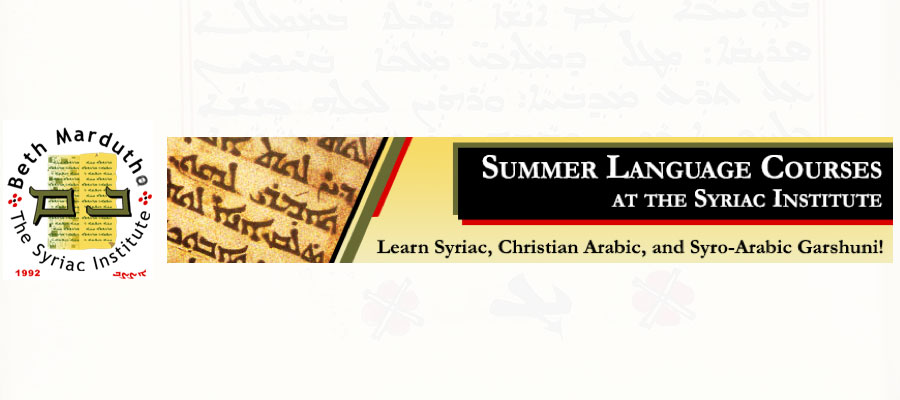2016 Beth Mardutho Summer School, Beth Mardutho Campus, Piscataway, NJ, July 11–August 12, 2016
Building off the success of previous courses, Beth Mardutho (The Syriac Institute) is expanding its summer course offerings to include not only Syriac (beginner and intermediate courses), but also Syro-Arabic (also called Garshuni) as well as Christian Arabic.
COURSES
Syriac I: Introduction to Syriac (July 25 - August 12, 2016; 9:00 AM - noon). Instructor: George A. Kiraz
Students with no prior experience in Syriac will learn introductory reading, writing, grammar, and should be able to translate introductory texts including passages from the Syriac Peshitta Bible by the end of the course with the help of a dictionary. During the first week of the course, the students learn the alphabet and basic reading, as well as gender (masculine & feminine) and number (singular & plural). The second week introduces verbs as well as prefixes and suffixes after which the student will be able to analyze texts. The last week and half of the course is spent on reading and comprehension including the translation of basic texts and texts from the Peshitta Bible. The course includes team translation activities. A hybrid method of teaching will be used drawing from both traditional reading/writing and immersion (conversational) models. Classes will be held Mon–Friday, 3 hours per day. Students are expected to spend the rest of the day doing homework and preparing for the next day's lesson.
Syriac II: Intermediate-Advanced Syriac (July 25 - August 12, 2016; 2-5 PM). Instructor: George A. Kiraz
This course is geared towards students who have already done Syriac and would like to dig deeper into the grammar and nuances of the language. Each day we read texts and go through the grammar of Coakley-Robinson, translating from Syriac to English as well as from English to Syriac. The Syriac texts that we translate differ from year to year; the instructor sets the text for the first week, but for the rest of the course students pick the texts that are of interest to the group, giving them the chance to read material and genres that are of special interest to them. Students will be exposed to West Syriac, East Syriac, and Estrangela texts in addition to reading manuscripts. The Beth Mardutho library, one of the largest private libraries in the world on Syriac material, is at the disposal of the class and can be used to answer even the toughest questions. Classes will be held Mon–Friday, 3 hours per day. Students are expected to spend the rest of the day doing homework and preparing for the next day's lesson.
Christian Arabic (July 11-22, 2016, 9 AM - 1 PM). Instructor: Alexander (Sasha) Treiger
The course will introduce students to Christian literature in Arabic written from the eighth century to the present. Students attending this course must be able to read Modern Standard Arabic and Classical Arabic. The readings will cover select genres of Christian literature in Arabic: biblical and patristic translations, apologetic and polemical literature, lives of the saints, and world chronicles. Select texts will be read in printed editions (whenever available) and in manuscripts. Additionally, the course will offer a general survey of Middle Eastern Christianity, its ecclesiastical, ethnic, and linguistic divisions, and Christian Arabic Studies as a field of research.
Syro-Arabic Garshuni (July 11-22, 2016, 2 PM - 6 PM). Instructor: George A. Kiraz
Syro-Arabic, also called Garshuni, is the writing of Arabic texts in the Syriac alphabet. Students attending this course must be able to read Modern Standard Arabic or Classical Arabic. No Syriac knowledge is assumed. The course will introduce the Garshuni writing system with simple texts and then moves to reading Garshuni texts from both printed books as well as early manuscripts. The texts differ from year to year giving one the chance to keep taking this course. The instructor sets the text for the first week. Students pick the texts that are of interest to the group for the rest of the course, giving them the chance to read material and genres that are of interest to them. Exercises include translating Syro-Arabic texts into English as well as transcribing texts between the Arabic script and the Syriac script.
Fees and Housing
Class Fees are $875 per student per course. Students may register for more than one course as long as there is no time conflict. Limited rooms are available at the Rutgers University Inn and Conference Center.
